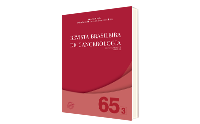The Importance of Early Monitoring and Identification of Cardiotoxicity of Trastuzumab Treatment in Breast Cancer: Case Report
DOI:
https://doi.org/10.32635/2176-9745.RBC.2019v65n3.570Keywords:
Cardiotoxicity, Breast Neoplasms, Trastuzumab, Drug TherapyAbstract
Introduction: Breast cancer represents the most common neoplasm among women, with elevated morbimortality. With the appearance of new drugs, there has been an increase of global survival; however, trastuzumab, a monoclonal antibody used in the treatment, may promote cardiotoxicity that should be evaluated and monitored during treatment. The aim of this article is to describe a case report of a patient presenting trastuzumab-associated cardiotoxicity and the importance of monitoring and early identification of cardiotoxicity through echocardiography (ECHO). Case report: A 63-year-old female patient, hypertensive, obese, with breast cancer, presented trastuzumab-associated cardiotoxicity, reduced left ventricular ejection fraction (LVEF), who developed diabetes after the treatment. The patient underwent regular echocardiography follow-up during treatment and this process was essential for early detection and appropriate management of trastuzumab-associated cardiotoxicity. An algorithm was used to determine the causality. Conclusion: This study shows the importance of LVEF follow-up with ECHO in patients undergoing cardiotoxic chemotherapy, and the monitoring of possible metabolic changes after oncologic treatment.









